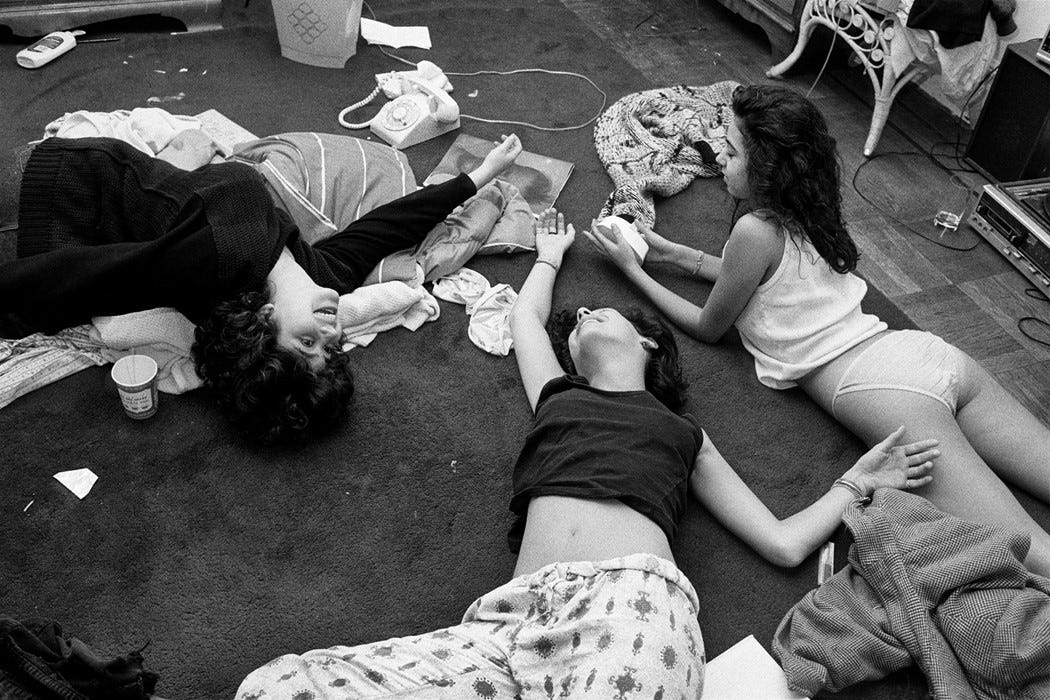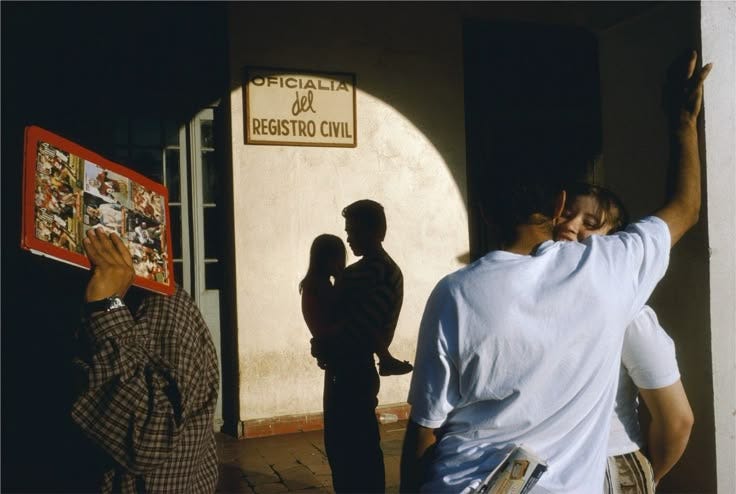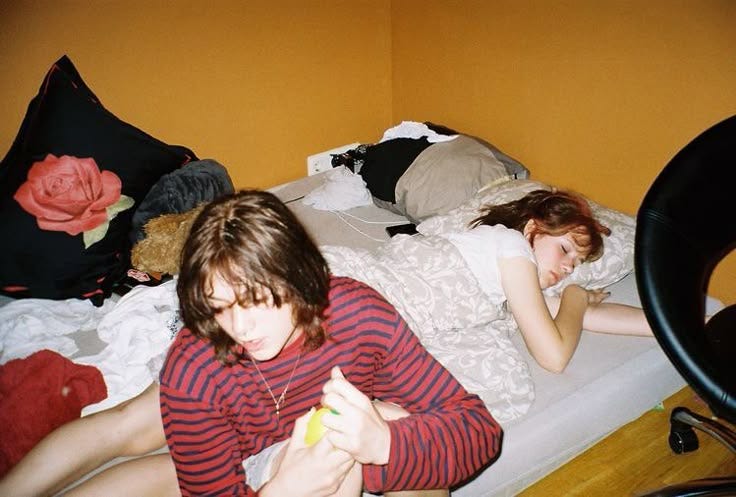Bestfriendland: General Admission - Ticket Required
on the imposed formality & fragility of adult friendships
A recession is breathing down everyone’s neck and continues to linger even after the unassuming mass dissipates.
We’re making less money, the ice caps are melting and platonic relationships prove to be vital to facilitate healing and cope with life’s challenges. There is plenty of well-researched, thoughtful writing on the state of interpersonal relationships and what it means to be a friend, specifically observing the environmental and societal impact since the COVID-19 pandemic began. In what many consider a masterful dissertation on “loserdom” and the rise of self-proclaimed internet agoraphobics, Telling the Bees underscores how loneliness has shifted from a transient struggle to a phenomenon that is now marketed and made merry. The girls are reveling in decay, while others turn to MBTI personality types as makeshift diagnoses. Labels such as “introvert” and “extrovert” are wielded alongside jobs and schedules and fatigue and social anxiety as excuses for social ineptitude. Rebuttals made against the innate need for close friendship and intimacy echo sentiments similar to “You just need to learn to be happy alone” and “I only have one friend but I’m honestly fine with that” or the worst one I’ve seen yet:
“No one owes you anything. You aren’t entitled to anyone’s time or friendship.”

A recent study led by Natalie Pennington at Colorado State University reveals the emerging "loneliness epidemic" is not due to a lack of friends. In fact, 42% of participants stated they wished they were simply closer to their friends. The problem appears to arise from a lack of time and opportunities to cultivate deeper relationships, or possibly from a reluctance in participating altogether. Jillian, 24-year-old writer in Brooklyn, reflects on how friendship has changed since her childhood and the adjustment she’s had to make to this new reality. “Friendships for me have become something I have to intentionally nourish to maintain,” she says. “Even living in the city, seeing a friend who lives down the street can be hard. Everyone is doing something. I am always doing something. Sometimes, I’m the friend who doesn’t answer for a while.” Jillian’s experience highlights a broader trend in modern society. We find ourselves in an era where companionship is sought after more than ever. People are shelling out monthly subscriptions just to have the privilege of seeing the same familiar faces once a week at a book or running club— a rare consistency in a world of fleeting connections. Dating app profiles are being created “just for friends”, with many yearning for the warmth and security of a solid friend group. With social events and speed dates and mixers being planned left and right, it’s time to get serious about love.
Platonic love, that is.
With the erosion of structured social spaces from university and increasing demands of professional life, “bestfriendship” beyond the age of twenty three seemingly becomes gatekept through a coveted golden ticket only a few can obtain. Sometimes inherited through the atypical union of childhood friendship, other times earned through the effort of diligently building community in university, this ticket is non-transferable. It’s uncommon and troublesome to come by this ticket again, so it’s wise to store it in a secure location. Away from long term partners, away from strenuous jobs, and away from resentment or burnout.
If adolescence is a battle (as it often feels), the strongest weapons in one’s arsenal when it comes to friendship are proximity and familiarity, suggests a study led by Cornelia Wrzus of Johannes Gutenberg University. The study highlights that young adults often form new friendships with people who are geographically close in their daily lives. For instance, people living in close quarters, like college dorms, are more likely to become friends. Previous studies show simply sitting next to someone on the first day of college can significantly increase the chances of becoming friends a year later, compared to students who met in different settings or at later stages. “I often think of the days of seeing my friends at school. No planning necessary.” continues Jillian. “We all had this common space we’d have to go to everyday. I miss my mom scheduling my “playdates” with my friends’ moms, and I miss the physical closeness we shared living in the same area.” Friendships after the age of twenty five (especially emerging ones) often disentangle, shedding the hyper-casual structure that defined adolescence and hindering the development of “bestfriendship.” The most formal hangout at sixteen was ending a night at the movies with a mediocre meal at a lackluster chain restaurant. Every encounter now must be penciled in, RSVP’d and approved at least 10 days in advance. Hangouts are often scheduled after weeks of radio silence, solely for the purpose of catching up.
When did things become so ungiving? When did it become gauche or improper to text a friend with day-of plans or propose coming over to lounge around?
As we age, the bond that supports the weight of close friendship begins to weather and unravel, leaving mere threads and remnants of what really is just casual connection. “I’ve learned not to take it personally when my long-distance friends don’t answer my texts for an extended period of time, even if I start to feel like we’re drifting or I’m not a priority anymore.” concludes Jillian. “My circle feels smaller but I know there’s only so many things I can nourish at once.” People relocate, graduate programs begin, relationships focused on marriage deepen in seriousness, and the commutes from hybrid and in-office positions render our “5-9 routines” lethargic and useless. How do we navigate the challenge of simply existing while striving to nurture both new and old friendships?
Can we bypass the formalities of adulthood to turn the potential for “bestfriendship” into a tangible reality?
How to Get into Bestfriendland (Free Admission, No Ticket Required)
To a select group of people on this Earth, friendships are inherently romantic.
As visions of long-term commitment and settling in age sharpen, it isn’t soulmates or spouses that emerge— rather, platonic connections that have matured and endured the test of time. According to a Pew Research survey, we value friendships over marriage and parenthood when it comes to leading a fulfilling life. 61% of us believe close friends are essential, while only 26% see having children or being married as the key.
There’s no crash course on how to fortify a friendship, but here’s what I, Stranger on the Internet, can tell you. Firstly, excessive formality kills budding or fragile friendships. If we want a friendship to grow, sensible notice of one’s proclivity for availability and engagement is key. Secondly, closeness and intimacy grow from both uninhibited, “hyper-casual” encounters and consistent interactions. “When I first moved to the city, one of the very first friends I made was through Instagram DMs,” says Eve, a 28-year-old architect in Los Angeles. “We met for dinner one night and had such great conversation. It felt like I had known her for years.” Eve recalls feeling eager at the prospect of seeing her again, yet was concerned about appearing needy or odd. “I wasn’t too sure what felt right. I planned to play it cool and wait about seven to ten days to reach out again,” she says. “To my surprise, she texted the next day with an invite to a friend’s gallery opening later that week. From then on, she would text me to see what I was up to on mundane weeknights or ask if I wanted to join her for a friend’s game night. It took me aback at first. It was so different from how I had previously made plans with friends, so it felt like the ‘wrong’ way to socialize as an adult.”
Eve concludes by noting that her friend’s candor made her feel safe and comfortable enough to reciprocate. They began accompanying each other to luxurious brand events, enjoying impromptu summer picnics, and having sleepovers spent venting about toxic exes. “She’s forever changed the way I view adult friendship. Sometimes she’ll reach out and I won’t be available, and vice versa,” she says. “It really doesn’t have to be complicated. We pursued our friendship with the kind of intention and thoughtfulness typically reserved for a romantic relationship, and I don’t think we would be as close without that.”
Although I wish I could present my thoughts as entirely objective and infallible, their truth ultimately proves itself. Proven research highlights the efficacy of the lighthearted, giggle-filled methods in which we established closeness and intimacy as children. In young adulthood, as during other life periods, newly acquainted people become friends through regular, intimate, and pleasant interactions. In fact, during intimate interactions, individuals share personal information, fostering trust and emotional closeness, which can turn acquaintances into friends in just a few weeks or months.
As the dynamics of human connections and the meaning of friendship evolve, it's important to remember we still have control. To become the leanest, meanest, most advanced version of a friend, restore social engagement focused on the practice of doing nothing— or at least, an activity in dangerous proximity to nothing. Brief, more intentional get-togethers or quiet parallel play over Facetime. When the sun hides away during the depths of winter, I’ll invite you to come over on an idle Friday night. We’ll sit on my bed or binge a tv show or order Chinese or paint each others nails or make a book club or go for a walk. Invite your friend who will innocently ask their friend to come along. We’ll do it again and again and again and again, steadily inching closer and closer to bestfriendship.








This is so fucking important and I enjoyed reading this very much.
love that i can read this so clearly in your voice. an important read and reminder to myself (!!!) to allow spontaneity, especially with friends. one of my fondest memories from this year was when my friends (a married couple) picked me up after an event for dinner. totally unplanned, just a spur of the moment thing, but such a cherished moment for me.